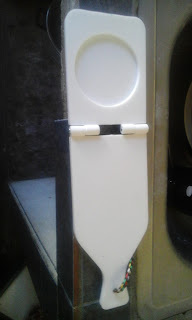My US “normal” was sort of out there already for people who
don’t do technical theater/live event work.
Until a week before I left I was working as a stage manager,
house manager, theatrical electrician, with the occasional temp admin job thrown
in for good measure (or a semblance of stability). I lived a very public professional life. I would get recognized or bump into a
colleague pretty frequently. I didn’t
have much of a social life because I was always working and the little social
life that I had was directly related to the work I was doing at a given moment
(coffee before a show call, post show drinks, going to see a show at a theater
I was hoping to start working for).
Sometimes I’d treat myself by going to the movies (usually alone), but
that was pretty rare. I didn’t have a
smart phone, or a single stable employment.
I used WiFi to watch TV.
Peace Corps is the most stability that I’ve had in years and
it’s exactly what I was looking for when I decided that I wanted a change.
I still live alone, but I have a cat now (my first pet,
ever) and I’m reteaching myself how to cook (after forming some very bad
cooking and eating habits living the freelance life), I’m friends with my
neighbors.
Sometimes the water or electricity go out, and it’s
annoying, but totally manageable. The
potential of not having water or electricity was a huge source of stress before
I came to Panama, but it doesn’t really stress me out anymore, if it happens I
deal with it.
I’m much less of a picky eater in Panama. I’ll eat pretty much whatever I’m given. The only exception so far was sau (pig feet). I just couldn’t do it. I couldn’t get past the consistency. [I’ll do a post on food soon.]
I light my stove with a lighter (or matches), which used to
scare me but now I get confused if I don’t have to light a stove that way.
I throw my toilet paper in a trash can, which used to be
really gross, but now it’s just life.
I know what I can find in the local store (and how much
things cost off the top of my head) versus what I need to get from a bigger grocery
store in Santiago (and what I can find in each of those stores.
I’m getting better at budgeting money and I know exactly how
much I currently have in my bank account.
I eat a fondas (small
restaurants) now that I never would have gone to in my pre-Panama life because
their general aesthetic would have screamed “food poisoning”.
If I’m out, one of my favorite things to eat for breakfast
is fried chicken. Which I’ve eaten with
my hands sitting in the bus terminal waiting to go to my friend’s site.
I still use public transportation to get everywhere, but now
I actively avoid traveling at night (what used to be one of my favorite things
to do).
I could keep going, and maybe someday I will.
I just know that this is exactly where I’m supposed to
be. When I saw one of my college
roommates in the US, she told me I was glowing.
I’m at my best when I’m traveling.
I like the challenge and the adventure of it.
Who knows how many “new normals” I’ll find.
 |
| Blogging Abroad's Boot Camp Blog Challenge: Starting January 2015 |

